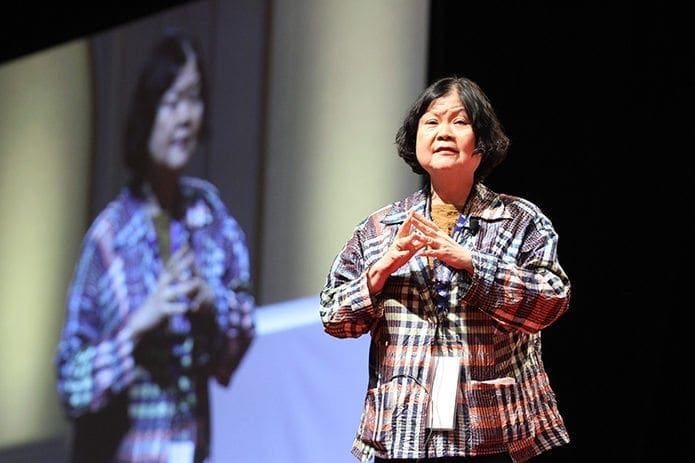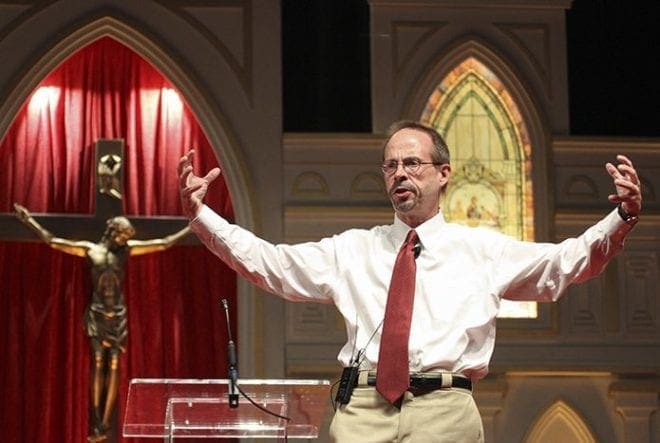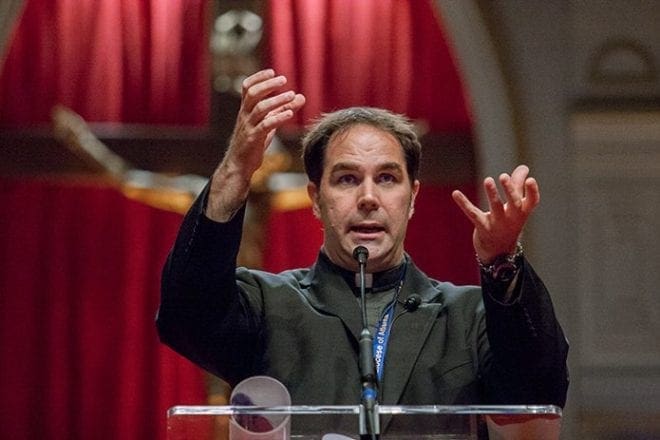 Photo By Michael Alexander
Photo By Michael AlexanderCollege Park
English track speakers proffer revelations of God’s mercy
By ANDREW NELSON, Staff Writer | Published June 10, 2016
COLLEGE PARK—The speakers for the English track at the 2016 Eucharistic Congress wove stories and insights of mercy as they encouraged the thousands in attendance to follow a path of trusting God and service. The roster included a journalist, who spoke about Pope Francis; a woman, who joined the church despite her deeply held atheism; the chief executive officer of the international relief agency of the American Catholic church; and bestselling authors and radio personalities.
Model of forgiveness
“The most powerful word in the English language is forgiveness. We use it cheaply. We use it casually. Some people think the word forgiveness is easy,” said Allen Hunt. He is a convert to the faith, who chronicled his 2008 journey of faith in his bestseller, “Confessions of Mega-Church Pastor: How I Discovered the Hidden Treasures of the Catholic Church.”
But then those people have not experienced the low depths of human experience, he said. Too many people carry around the poison of bitterness and resentment, burdening themselves by keeping tabs on everyone who has wronged them, he said. “The most powerful word in the English language is also the hardest,” he said. People think showing forgiveness will make them a doormat and others will take advantage of them, he said.
But the effort is necessary and the church should be the model of forgiveness, he said. “Jesus is a radical. He takes this forgiveness thing to the extreme,” he said. He reminded the large crowd how one of Jesus’ last acts on the cross was a message of forgiveness to the soldiers who executed him.
Pope Francis emphasizes to people that the church is a field hospital—“it isn’t a warehouse for those who are perfect. Otherwise, the churches would be empty,” Hunt said. “The sacraments are not for the perfect, the sacraments are for the rest of us,” he said.
And during this Extraordinary Year of Mercy, holy doors are there to help people be healed. “We’re flinging open—not gently unlocking and opening—the doors of mercy, we’re flinging them open, we’re flinging open the gates of heaven and the mercy of God may come rushing down … like a waterfall,” he said.
Hunt talked about Nelson Mandela, the long-time political prisoner, who when elected to the presidency of South Africa invited his prison warden to sit on the dais with him. He established the Truth and Reconciliation Commission. When political allies warned him not to take that route and the country demanded justice, Hunt said Mandela answered the critics by saying the country needed to overcome racial and political history of violence with healing.
People need to believe they are worthy of second chances as the Holy Spirit helps individuals put down bitterness, which poisons their own soul, he said. “God’s mercy sets us free.”
An insightful view of the papacy
John Allen Jr. has authored 10 books on the Vatican and Catholic life. He is the editor of Crux, an online news source specializing in coverage of the Vatican and the Catholic Church, in addition to being the senior Vatican analyst for CNN. His most recent book is “The Francis Miracle: Inside the Transformation of the Pope and the Church.”
Allen said mercy is the lens to view and understand the papacy of Pope Francis. It is the glue that holds together his view of a missionary church with the value of simplicity.
“The gospel of mercy is the core of it all,” he said.

John Allen Jr., seasoned Vatican journalist and author, shared some personal insight about Pope John Paul II, Pope Benedict and Pope Francis. Allen said he thinks Pope Francis will be remembered as the “pope of mercy.” Photo By Michael Alexander
Allen told anecdotes and insights about the pope, who he said has popularity numbers that would make any politician envious and a positive view that is shared across the American Catholic church, despite the divisions between progressive and traditionalists in the church.
As pope, his position requires him to speak of both mercy and judgment. One without the other would be an oversimplification, Allen said.
Allen said, “But in his calculation in many important respects, the world has already heard our judgment. Now the world needs to hear and to see and to feel and to taste and, yes, even to smell our mercy.”
Allen said Pope Francis will be remembered as the “pope of mercy.” Pope Francis didn’t invent mercy and other popes have embraced it, but Pope Francis centered the church’s vision on it. Allen said, “At a time when our commitment to mercy was sometimes difficult to sense and experience and difficult to get your hands on, this is the pope who lifted it up, dusted it off, made it palpable, attractive, compelling again.”
Pope Francis draws such attention because of his authenticity, Allen said. The simplicity of life that he projects is truly him, not contrived. Allen told of doing research for a book when he visited the slums of Buenos Aires, Argentina, where the pope had served as archbishop. The parish priests told Allen to talk to families who lived in the shacks. When the American reporter asked, they brought out prized family photos with the future pope engaged in their lives, administering the sacraments, being with the people, said Allen.
“That’s where the pope spent his time,” he said.
With his engagement and his love of people, the pope wants to move the church into a missionary posture, Allen said. “He wants to be the missionary-in-chief of the Catholic Church,” he said.
As a Jesuit, the pontiff envisioned a life of the other great Jesuit missionaries, but that never came to be, Allen said. Instead, he wants the church members to put themselves “out on the street where people live,” Allen said. The call is to get out of the sacristy and into the street, he said. And the work is done one to one, so Catholics engage with people, he said.
And Pope Francis works to set an example, stopping the popemobile to give children rides, or kissing and embracing people who are severely disfigured, Allen said.
“It is about setting the tone of the life of the church,” he said.
Using pithy lines, Allen described the three most recent popes and their catchphrases. For St. John Paul II, he said he’d be known for “Be not afraid.” For Pope emeritus Benedict XVI, he’d be known for “Faith and Reason.” And Pope Francis would be known for “The Lord never tires of forgiving. It is we who get tired of asking.”
The future facing the church is will others follow the pope’s lead, asked Allen. If the pope inspires people to make the church their faith home, will they find the church cast in the pope’s vision of a church reaching out to people, with mercy at the fore?
“Mercy is the spiritual Rosetta Stone of this pope,” he said.
Motivated by “God’s great love”
Catholic Relief Services CEO Dr. Carolyn Woo opened her 45-minute talk telling a story about love.
The story begins with a Christian family—in Syria, held captive by ISIS. The way the family sees it, the experience was a time to witness God’s great love.
After a year, when they stayed strong in their faith, the family was released. During the captivity, one of the sons made a rosary using olive pits. CRS is providing help to this family
They aren’t motivated by revenge, Woo said, but they want to be “a witness of God’s great love for us.”
“They think of their experience now as a seed of love,” she said.
In a letter, the family wrote how evil’s purpose is to dehumanize.
“We never thought of our human captors as the enemy. But there is evil in this world. And there is evil that tries to takes away our humanity. That tries to let hatred be the coin of circulation. That’s where the evil is. The evil that drives out love of one person for another person,” said Woo, who has spoken with the family in a video call.
Faith provided them a reservoir to hold onto what is the most important thing for them, she said. “For them, it is their sense of God, that God is real in their life.”
People know the love of God is limitless, but people need to be willing to engage God, it isn’t forced, she said. “God is there for us, but we need to want God. We have to have a desire for God.”
Bible stories are filled with examples of God’s urgent love for women and men, she said. While the Bible stories are well known, they are not always lived. Woo said she believes the message can be summed up as “come and go.”
“Pope Francis’ call of mercy mirrors Jesus’ invitation to come—this is a merciful God, come to me,” she said.
But the command to go is equally important, she said, adding how an American bishop says the most important sign in a church is the exit sign as people take the message of the church into the world.
“Go, that is what we are charged to do. It fills our life,” she said.
In the Gospel of John, Jesus interrogated Peter and asked if he loves him. When Peter replied he did, Jesus told him to both feed and tend Jesus’ sheep, said Woo.
“We know feed and tend are very active words. When we come to God, we have to go, go out filled with Christ. With evangelization, when filled with Christ, you share Christ. And then sharing with Christ is action, and James reports faith without action is dead.”
“The invitation is from God. There is almost an urgent desperation of God to reach out. God said come, now we have to go.”
Woo said faith tells us there is an urgency about the love of God. But it was a friend who reminded her that life isn’t lived alone, but everyone working together for a common goal. “We are meant to do this together. Together we are on this journey back to God with our brothers and sisters. When we receive the Eucharist, we are committing ourselves to others.”
A journey to true faith
Jennifer Fulwiler said she was a skeptical, questioning atheist until she came face to face with her newborn baby.
“I knew more than anything I knew in the whole world … that love had a source,” she said.
She said she grew up in a household where faith wasn’t part of the discussion. It wasn’t part of her life as an adult either. It wasn’t until Fulwiler, who is a writer, speaker and host of The Jennifer Fulwiler Show on SiriusXM Channel 129, discovered the Ivy League–educated man who would become her husband was a Christian. She said she grew up presuming the smartest people in the room were the atheists. His faith and the birth of her first child took her on a journey, to dig deeper into faith.
She started from the beginning of faith, learning about the Bible and reading it, asking who is Jesus Christ, keeping her eyes open for God’s presence, and other actions for a person moving from no faith to a life of faith. One truth she learned on her journey: “Prayer is not a divine ATM where we control God,” she said.
Her searching led her to write on a blog, where she thought her insights would convince believers of their errors. Instead, her path dove deeper into the faith.
As the journey progressed, she found a complexity of answers to her questions. Internet searches didn’t help, until she came to read material about the Catholic Church.
“When I read up on what the Catholic Church had to say about itself, it was like the user manual for the human soul. We see the fingerprints of God in the church,” she said.
And she came to understand the answers that atheism gave weren’t enough.
She’s come to learn that in “messes of my own doing,” she’s seen God’s action in her life. She said she’s trusted Jesus, who has promised never to leave his followers alone.
“You will never fully understand God until you understand his mercy,” she said.
And that mercy of love is to be shared in the world. “He calls us to a high standard of love. It’s not easy love. But it’s the kind of love that changes the world,” she said.
After telling her story, Fulwiler revealed that while she claimed to have no faith, in fact she was Catholic. To her surprise, she was baptized in Atlanta at Our Lady of the Assumption Church, as an infant. For her Irish family, it was a cultural event only.
Fulwiler said she shared the story as a message of hope that even when people stray from their roots, God is always working to be close to them. “There’s hope for everyone. Like me, they have belonged to Christ all along.”
A tale of transformation
Father Donald Calloway entertained attendees in the English track with the story of his transformation from a drug-fueled adolescent to finding the church. He credited the Virgin Mary for drawing him first to a Catholic Navy chaplain and then later to the priesthood. A priest with the Congregation of the Marians of the Immaculate Conception, Father Calloway wrote about his story in the book, “No Turning Back: A Witness to Mercy.”

In the English track at the 2016 Eucharistic Congress, Father Donald Calloway, MIC, shared the story of his transformation from a life of drugs to becoming a priest of the Marians of the Immaculate Conception. He has a special devotion to the Blessed Mother. Photo by Thomas Spink
He said Mary was the hook God used to lure him to the faith. After extreme teenage rebellion, including expulsion from Japan, two stints in rehab facilities and using drugs, the priest said it was a book about the Marian apparitions in Medjugorje that spurred him to seek out a Catholic priest. After pouring his life story out to the priest, he began to learn more about the faith.
During a Eucharistic celebration at Mass, he felt God’s presence. He said that time in his life was “God’s rehab. It was something entirely different from what I had experienced before.” And he began the process to formally enter the church. “I began a romance with God. I cried. All my friends left me. I became a fool for Christ. And it was awesome,” he said, as the audience applauded.
A community of Filipino women encouraged him, giving him books and prodding him to think about the priesthood, he said. Eventually, that led to the Congregation of the Marians of the Immaculate Conception where he was ordained in 2003 at the National Shrine of The Divine Mercy in Stockbridge, Massachusetts.
For all the trials he put upon his mother, Father Calloway said his mother is “my St. Monica,” referring to the faithful mother of St. Augustine.
“As long as you have a pulse, you’ve got hope. God has not abandoned you. He has not abandoned your family, your husband, your marriage, your children.” He said that people need to be faithful in prayer and trust that God has a plan.